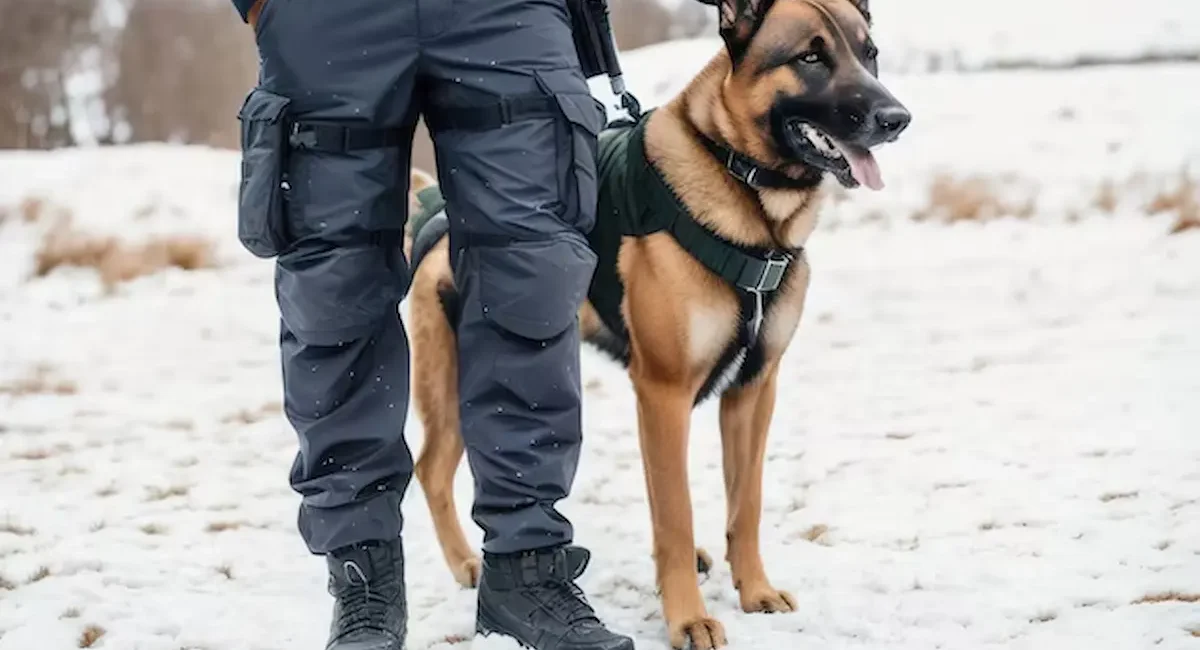K9 police dogs are essential partners in law enforcement, from tracking criminals to detecting drugs and explosives. To perform at their best, these dogs have unique needs that must be met. In this blog, we’ll explore
The Unique Needs of K9 Police Dogs: How to Keep Them Healthy and Effective and highlight the care they require to stay strong, focused, and ready for action. Whether you’re a handler or just fascinated by these amazing dogs, understanding their needs is crucial to supporting their success in the field.
What Makes a Dog K9?
K9 dogs are much more than regular pets they are specially trained to assist in law enforcement, search and rescue, and other important roles.
Due to its loyalty, and skill in many physical respects, it is best suited for several high-stress jobs.
Want to know about K9`s History Click Here
Unique Needs of K9 Police Dogs
Below are 8 Unique Needs of K9 Police Dogs to keep them Healthy and Effective
1. Physical Fitness
- K9 police dogs need regular exercise to stay active and fit.
- Daily training routines help maintain their strength, agility, and stamina.
- Physical activity ensures peak performance during high-stress and chaotic situations.
2. Proper Nutrition
- High-protein meals support muscle strength and energy levels.
- Veterinarians carefully plan their diet based on activity level and size.
3. Mental Excitement
- Beyond physical fitness, K9s need mental challenges like problem-solving and scent detection.
- Handlers use games, obedience drills, and scent training to keep them sharp.
4. Veterinary Care
- Regular check-ups, vaccinations, and dental care are essential.
- Specialized vets address unique health issues like joint pain and stress.
5. Rest and Recovery
- Adequate rest after intense work ensures optimal performance.
- Recovery care may include massages or therapy sessions to ease muscle tension.
6. Emotional Bonding
- Strong bonds between K9s and handlers foster teamwork and trust.
- Handlers provide emotional support to help dogs stay calm and focused.
7. Special Equipment
- Protective gear like vests and boots ensure safety during operations.
- Durable, high-quality equipment helps them work comfortably and securely.
8. Retirement and Aftercare
Retired K9s often live with handlers or find loving homes.
They are cared for with respect and gratitude for their years of service.
Life of a K9 Police Dog
K9 dogs have special careers in training and service. They usually work for about 8-10 years, depending on their health and the type of work they do. During their active years, they are highly valued for their skills in detecting, protecting, and tracking, making them essential members of law enforcement teams.
Retirement for K9s
- Once a K9 police dog reaches the end of their service, they retires, often between 8 and 10 years of age.
- After retirement, these loyal dogs are usually adopted by their handlers or families who understand their unique needs.
- In some cases, organizations help find suitable homes for retired K9s to ensure they live comfortably.
Care and Life After Service
- Retired K9 police dogs require special care, especially if they’ve experienced intense physical demands or health issues from their work.
- They may need more frequent veterinary visits, balanced diets, and joint care to maintain their health.
- These dogs often continue to enjoy an active lifestyle, but in a more relaxed environment, spending their remaining years as beloved family pets.
Conclusion
K9 police dogs are true heroes who dedicate their lives to protecting and serving communities. Understanding their unique needs helps keep them healthy, focused, and ready for action. From proper nutrition and regular exercise to mental stimulation and emotional bonding, these remarkable dogs deserve the best care during and after their service.
As they transition into retirement, their loyalty and hard work should be honored with love and attention. By meeting their needs, we ensure that K9 police dogs continue to thrive, whether on active duty or enjoying life as cherished companions.

